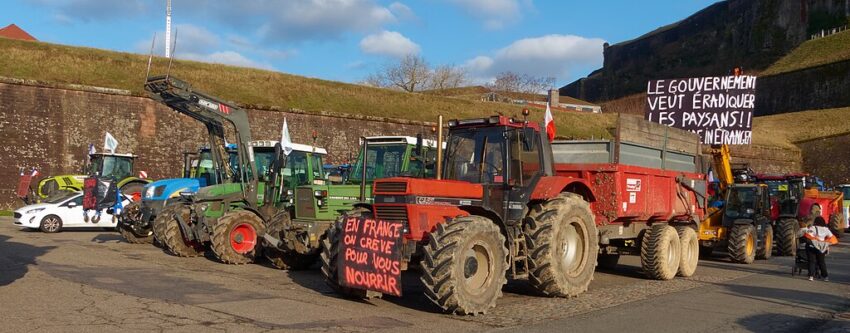The Current Outcry on French Soil
French farmers have once again taken to the streets, blocking highways around Paris in a renewed wave of protests that reflect deep-seated grievances. The movement, which saw a resurgence on January 5, 2025, is not merely a flash of discontent but a culmination of years of frustration over what farmers perceive as detrimental policies and trade agreements.
French farmers have mobilized convoys to block roads around Paris, protesting against unfair competition from imports and burdensome regulations, reigniting opposition after the EU-Mercosur free trade deal. With frustration mounting over the impact on their profits, these… pic.twitter.com/inUPavWZwk
— thefinance360 (@thefinance360) January 6, 2025
The EU-Mercosur Trade Deal: A Catalyst for Unrest
At the heart of the protests is opposition to the proposed free trade agreement between the European Union and the Mercosur countries of South America (Brazil, Argentina, Uruguay, and Paraguay). Farmers argue that this deal would flood the European market with cheaper agricultural products produced under less stringent environmental and health regulations than those imposed on European farmers. This could lead to an unfair competition where French farmers are unable to match the low prices of imports, threatening their livelihoods. The deal, which has been in negotiation for years, remains a significant point of contention, with French opposition rooted in fears of market distortion and the undermining of local agricultural practices.
Regulatory Burdens and the ‘Green’ Dilemma
Beyond trade, French farmers are vocal about the regulatory burdens they face. EU environmental policies, including the Green Deal, impose strict regulations on pesticide use, land management for biodiversity, and emissions, which many farmers believe are unworkable in practice. These regulations are seen as both costly and complex, reducing profit margins while not necessarily yielding immediate environmental benefits. There’s a growing sentiment among farmers that they are being used as scapegoats for environmental policy, with regulations that are too stringent or not tailored to the realities of farming.
The Broader ‘War on Farmers’
This situation in France is emblematic of a broader narrative some call the “war on farmers.” It reflects a global trend where agricultural policies are increasingly at odds with the economic realities of farming. The term encapsulates the feeling among farmers worldwide that they are facing an onslaught of regulations, market pressures, and diminishing governmental support, which together threaten the sustainability of farming as a way of life.
Economic Pressures: Rising costs for inputs like fuel, fertilizers, and labor are not met with corresponding increases in product prices, squeezing farmers financially.
Policy Misalignment: There’s a perceived disconnect between urban policymakers and rural realities, where policies seem to favor environmental goals over agricultural viability.
Global Competition: With international trade agreements, local farmers feel they are at a disadvantage, competing against countries with fewer regulatory constraints.
Why American Farmers Should Care
American farmers should pay attention to these developments for several reasons. The EU often sets trends in environmental and trade policy that could influence or pressure U.S. policy. If the EU-Mercosur deal goes through, it might encourage similar trade agreements, affecting U.S. markets. An influx of South American agricultural products in Europe could indirectly affect U.S. exports to Europe or alter global commodity prices, impacting American farmers’ bottom lines. Also, as environmental concerns gain traction globally, the regulatory pressures felt by French farmers could foreshadow what U.S. farmers might face, albeit at a lesser degree with the new Republican administration. The push for sustainable practices might come at a cost if not balanced with economic considerations.
The struggles of French farmers might resonate with American farmers, particularly those in states where agriculture is a significant part of the economy. There’s potential for shared strategies or advocacy, learning from each other’s experiences with policy and protest.
Conclusion
The protests in France are not just about immediate grievances but are a loud call for a reevaluation of how agricultural policies are shaped in light of global trade and environmental stewardship. As these issues unfold, they not only affect France but also send ripples across the global agricultural community, including the U.S., where farmers might soon face similar or related challenges. Understanding and engaging with these issues now could be crucial in shaping a productive future for farming worldwide.


